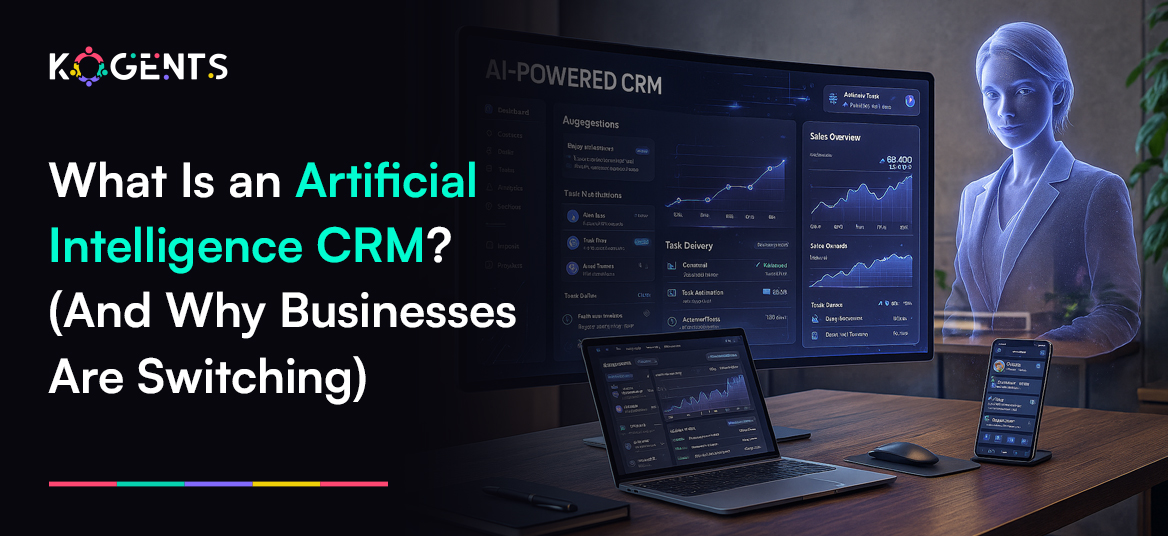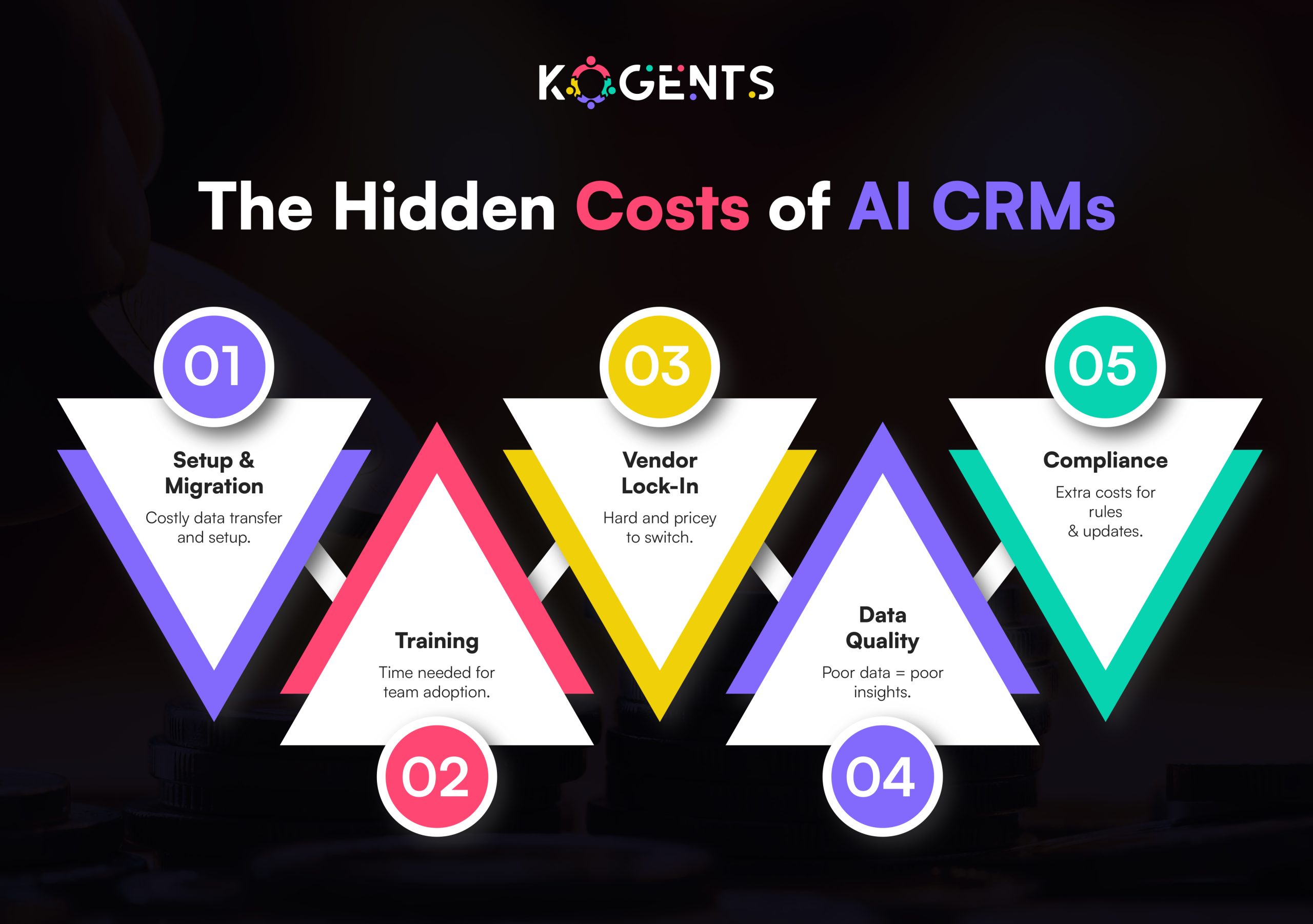What Is an Artificial Intelligence CRM? (And Why Businesses Are Switching)

Summary:
Customer relationship management (CRM) tools have been around for decades, but in 2025, a new breed is taking over: the Artificial Intelligence CRM.
Entrepreneurs and solopreneurs are ditching traditional CRMs in favor of smarter, faster, and more predictive AI-powered systems.
Why? Because AI is transforming how businesses connect with customers, close deals, and grow sustainably.
With integrations like WhatsApp CRM system integration and advanced chatbot automation, AI CRMs allow businesses to automate messaging, personalize outreach, and track interactions in ways legacy systems simply can’t.
And it’s not just about automation, it’s about insight, efficiency, and scale.
Let’s explore what an AI CRM is, why it’s booming in 2025, and how you can leverage it for your business.
Key Takeaways
- An Artificial Intelligence CRM empowers businesses to scale, automate, and personalize.
- WhatsApp CRM system integration is critical for real-time engagement.
- AI enhances analytics, lead management, and customer retention.
- Entrepreneurs and solopreneurs gain big-league capabilities with lean resources.
What Are AI Agents in CRM and Why Do They Matter?
AI agents in CRM are intelligent virtual assistants embedded in CRM platforms to automate, analyze, and enhance customer interactions.
Unlike static data entry tools, these AI agents use machine learning and natural language processing (NLP) to:
- Predict customer behavior
- Suggest next-best actions
- Automate repetitive tasks like email follow-ups or WhatsApp messages
- Deliver real-time insights to sales reps and support teams
For entrepreneurs and solopreneurs, this means less time managing customer data and more time closing deals.
Today, AI agents empower small teams to punch above their weight, allowing solo founders to offer enterprise-grade customer experiences.
AI also plays a huge role in omnichannel messaging CRM, integrating email, WhatsApp, live chat, and more into a seamless communication loop.
This isn’t just efficiency, it’s smarter decision-making at every customer touchpoint.
Why Entrepreneurs & Solopreneurs Are Switching to AI-Powered CRM Software in 2025
1. Time-Saving Automation
- Time is the most valuable currency for entrepreneurs.
- AI CRMs automate follow-ups, schedule meetings, qualify leads, and send reminders.
- No more chasing cold leads manually.
2. Smarter Lead Scoring
- AI CRMs analyze behavior, interactions, and buying signals across channels.
- Instead of guessing who’s a hot lead, solopreneurs get ranked lists of prospects ready to buy.
3. Integration with WhatsApp and Other Platforms
- With WhatsApp CRM integration, entrepreneurs can manage customer chats, automate responses, and convert conversations into deals.
- This is critical in regions where WhatsApp is the primary business communication channel.
4. Personalized Customer Journeys
- AI segments customers based on behavior, demographics, and engagement.
- That means hyper-personalized emails, offers, and outreach, at scale.
5. Cost-Effective Scaling
- With AI doing the heavy lifting, solopreneurs don’t need large sales teams to scale.
- AI handles the grunt work while you focus on growth strategies.
6. Unified Communication Across Channels
- Modern customers don’t stick to one platform.
- AI CRMs integrate multiple touchpoints (email, WhatsApp, chatbots, SMS) into a single view, making conversations consistent and efficient.
7. AI-Driven Forecasting
- AI CRMs help predict revenue, sales cycle length, and churn risk using real-time data.
- Entrepreneurs can plan better, avoid pitfalls, and allocate resources more effectively.
8. Better Customer Retention
AI agents analyze customer engagement signals to spot churn risks early and automate retention campaigns, a game-changer for solo businesses that can’t afford to lose clients.
Enhanced Customer Insights Through AI Analytics
Predictive Analytics for Smarter Decisions
AI CRMs don’t just track interactions; they analyze them.
Predictive analytics helps businesses understand:
- Which leads are most likely to convert
- When a customer might churn
- Which channel performs best
This data-driven intelligence lets entrepreneurs make faster, smarter decisions.
Note: Tools like Zoho CRM and HubSpot CRM now offer AI-powered dashboards that update in real time.
Sentiment Analysis for Real-Time Feedback
- AI can analyze the tone of emails, WhatsApp messages, and support chats.
- This sentiment insight allows brands to proactively fix issues and retain customers.
Customer Lifetime Value (CLV) Forecasting
- By analyzing purchase patterns and engagement, AI CRMs help project the future value of each customer.
- This helps in targeting high-value leads and managing resources efficiently.

AI in Sales and Marketing
AI-Powered Email & Message Automation
- Entrepreneurs use AI to automate personalized messages across WhatsApp, email, and SMS.
- This isn’t just bulk messaging; it’s AI-optimized timing, tone, and triggers.
Dynamic Ad Targeting
- AI CRM systems integrate with ad platforms to dynamically target high-intent users with precision.
- Whether through retargeting or lookalike audiences, AI refines your spend for better ROI.
Smart Lead Nurturing
AI enables behavior-based workflows.
Example: if a lead opens a WhatsApp message but doesn’t reply, an AI rule might trigger a follow-up SMS or email.
How AI Agents Work in Business Using CRM
AI agents function as the central nervous system of your CRM. Here’s how they typically operate in business environments:
1. Data Aggregation
- AI agents collect structured and unstructured data from multiple sources: websites, WhatsApp messages, emails, forms, and social media.
- This forms a 360-degree view of each contact.
2. Contextual Understanding
- Through NLP and machine learning, AI agents understand the intent and context of customer conversations.
- This allows them to respond intelligently and route queries appropriately.
3. Workflow Triggers
AI agents trigger workflows based on customer actions. For instance, if a user fills out a pricing form, the AI can:
- Score the lead based on behavior
- Assign it to a sales rep
- Initiate an email sequence
- Send a WhatsApp confirmation message
4. Predictive Suggestions
- Based on past patterns, AI agents suggest the next best action: call the lead, send a discount, or follow up after 3 days.
- These aren’t generic reminders; they’re personalized insights.
5. Real-Time Communication Handling
AI agents can handle incoming messages and chats using conversational AI. These bots:
- Answer FAQs
- Book meetings
- Escalate complex queries to humans
- Learn from each interaction to improve over time
6. Performance Feedback Loops
AI agents constantly analyze performance metrics like email open rates, chat satisfaction scores, and deal closure times to refine strategies and optimize interactions.
7. Seamless Integration with Tools
From WhatsApp API integration with CRM to calendar sync and pipeline updates, AI agents operate across platforms to keep everything aligned in real-time.
Use Cases for Entrepreneurs & Solopreneurs in CRM and AI Integration
1. WhatsApp Messaging Automation
Using WhatsApp Business API, solopreneurs can automate FAQs, send welcome messages, and convert leads directly from chats.
2. Lead Management
- Capture leads from Facebook ads, WhatsApp chats, and landing pages.
- AI automatically scores and routes them.
3. Appointment Booking
- AI bots sync with calendars and book meetings based on availability.
- No back-and-forth emailing.
4. Support Automation
Integrate a WhatsApp chatbot CRM for instant support responses, ticket creation, and escalations.
5. Upsell and Cross-Sell Recommendations
AI identifies customer behavior that signals interest in upgrades and recommends the right time and channel to pitch.
Advantages of a CRM + AI Integration
- 24/7 Availability: AI bots never sleep, offering round-the-clock support across WhatsApp, chat, and email.
- Hyper-personalization: Messages and content are tailored to user preferences, behaviors, and engagement history, increasing conversions and satisfaction.
- Lead Prioritization: AI scores leads based on multiple data points, allowing teams to focus on the most promising prospects.
- Increased ROI: With optimized ad targeting, improved lead quality, and better timing, AI integrations significantly boost marketing and sales ROI.
- WhatsApp Automation CRM Tool Benefits: Engage leads in real time with interactive messages, product catalogs, and click-to-chat ads.
- CRM Messaging Integration: Centralizes conversations from different channels into one dashboard, improving response time and reducing errors.
- Faster Decision-Making: AI analytics provides real-time performance insights, empowering business owners to act quickly. Systems leveraging HubSpot AI Integration deliver these insights directly within the CRM dashboard.
- Reduced Customer Churn: AI detects early warning signs of dissatisfaction and triggers retention workflows.
- Sales Forecasting Accuracy: AI uses historical data and current pipeline health to predict revenue with greater accuracy.
- Low-Code / No-Code Workflow Creation: Many modern AI CRMs allow users to build automation sequences without technical skills.

Challenges & Limitations of CRM and AI Integration
- Initial Setup Complexity: Integrating AI into a CRM requires strategic planning, data migration, and workflow mapping. Entrepreneurs without technical teams may need outside help.
- Data Privacy & Compliance: Using AI and tools like WhatsApp Business API must align with data protection regulations like GDPR, HIPAA, and CCPA. Missteps can result in fines and reputational damage.
- High Learning Curve: While low-code tools exist, understanding how to maximize AI’s potential still requires learning. Without proper onboarding, users may underutilize the system.
- Vendor Lock-In: Some CRMs offer proprietary AI features that can’t be exported or transferred easily. Switching providers becomes costly and complex.
- Dependence on Data Quality: AI insights are only as good as the data fed into the system. Inaccurate or incomplete data can lead to misleading decision-making.
- Limited AI Explainability: AI suggestions and automations may not always provide clear explanations for why certain actions are recommended, which can lead to trust issues.
- Integration Compatibility: Not all tools offer seamless CRM messaging integration, especially with niche apps or older platforms.
AI in CRM vs Other Tools (Comparison Table)
| Feature | AI CRM Platforms | Traditional CRM | Marketing Automation Tools |
| Lead Scoring | Predictive & automated | Manual | Basic scoring |
| WhatsApp CRM Integration | Native/Automated | Limited | Plugin-dependent |
| AI-Powered Messaging | Yes | No | Yes |
| Real-Time Analytics | Yes | Delayed or basic | Yes |
| Workflow Automation | Dynamic & behavioral | Rule-based | Semi-dynamic |
| Customer Sentiment Analysis | Yes | No | No |
| Self-Learning Algorithms | Yes | No | No |
Prepare Your Business for the Next Wave Using CRM and AI Integration!
- Audit Current CRM Tools: Identify gaps and limitations in automation, messaging, and lead management.
- Set Up WhatsApp Integration: Use a provider to enable WhatsApp API integration with CRM.
- Start Small, Scale Smart: Begin with one AI workflow (e.g., follow-up automation) and expand.
- Train Your Team: Educate your staff on how AI works, what it automates, and where human intervention is still needed.
- Track ROI from Day One: Use dashboards to measure time saved, leads converted, and customer satisfaction.
Case Study Spotlight:
HubSpot + WhatsApp Integration
HubSpot introduced a native WhatsApp integration for sales CRM in 2024, allowing users to track, automate, and reply to chats within the CRM.
Their AI tools flag high-intent conversations and recommend sales actions.
Salesforce + Einstein AI
Salesforce’s Einstein AI helped a fintech startup increase conversion rates by 38% through predictive lead scoring and automated WhatsApp reminders.
With WhatsApp integration for Salesforce, they unified chat and pipeline management.
Zoho + Zia AI
Zoho CRM users now rely on Zia to suggest workflows, track customer sentiment, and optimize message timing across WhatsApp, email, and SMS.
Pipedrive + Chat Automation
Pipedrive integrates AI with WhatsApp using partners like Twilio and Infobip. A travel company reported a 2x increase in lead-to-booking conversion by automating quote delivery via WhatsApp.
Freshsales (Freshworks) + Freddy AI
Freshsales uses Freddy AI to analyze customer queries, automate WhatsApp messaging, and improve sales rep productivity.
A logistics company cut down response time by 60% after deploying the AI-driven system.
Last Words!
The shift toward Artificial Intelligence CRM platforms isn’t just a trend; it’s a necessity in 2025.
As customer expectations rise and competition intensifies, entrepreneurs and solopreneurs need tools that do more with less.
AI CRMs, powered by predictive analytics, WhatsApp chat integration for customer relationship management, and deep personalization, are becoming the backbone of modern business.
Whether you’re managing a handful of clients or running a fast-scaling startup, adopting AI-driven CRM is your edge.
The barriers are falling; you no longer need an enterprise budget to access enterprise tools.
Want to automate smarter, connect faster, and sell better? Start your AI CRM journey today with Kogents.ai and drop an email at info@kogents.ai or give us a call at (267) 248-9454 and lead the change.
FAQs
What is an Artificial Intelligence CRM?
An AI CRM is a customer relationship management system enhanced with AI tools that automate tasks, personalize outreach, and predict customer behavior, helping businesses connect smarter and scale efficiently
Why are entrepreneurs and solopreneurs switching to AI CRMs in 2025?
Because AI CRMs save time, cut costs, and provide enterprise-level capabilities like predictive lead scoring, WhatsApp integration, and real-time insights, all without requiring large teams
How do AI agents work within CRM systems?
AI agents act as intelligent virtual assistants that automate workflows, analyze customer data, predict actions, and provide real-time recommendations, while seamlessly syncing with platforms like WhatsApp, email, and calendars
What are the main benefits of integrating AI into CRM?
- 24/7 availability and instant support
- Hyper-personalization at scale
- Accurate sales forecasting and lead prioritization
- Improved ROI with smarter automation and ad targeting
- Reduced customer churn through predictive retention campaigns
What challenges should businesses consider before adopting AI CRMs?
Some key challenges include setup complexity, data privacy compliance (GDPR, HIPAA), dependence on data quality, potential vendor lock-in, and the learning curve for maximizing AI features

Kogents AI builds intelligent agents for healthcare, education, and enterprises, delivering secure, scalable solutions that streamline workflows and boost efficiency.